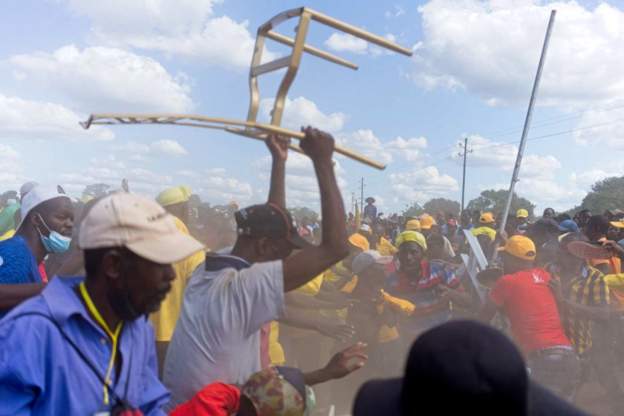Impunity for politically motivated violence remains a problem in Zimbabwe and is also a serious issue in the security forces and among civilian authorities who oversaw them, including police, military, and intelligence officers who frequently act in the interest of the ruling party, according to a 2022 country human rights report.
In Section One of the ZIMBABWE 2022 HUMAN RIGHTS REPORT titled Respect for the Integrity of the Person on the Arbitrary Deprivation of Life and Other Unlawful or Politically Motivated Killings, the report stated that in July 2022, an inquest into the September 2021 death of Sharai Mukaro while in custody at the Chivhu Police Station concluded that she died after being assaulted by Zimbabwe Republic Police (ZRP) officers.
“Media reports characterised the police assault as torture. There were reports that political actors engaged in politically motivated killings,” read the report.
According to the report, on February 27, 2022, youth linked to the ruling Zanu-PF party assaulted an opposition rally in Kwekwe the day after Vice President Constantino Chiwenga delivered a “provocative speech, killing one and injuring 22 opposition supporters.”
In March, suspected Zanu PF members “abducted, intimidated, and threatened to kill the sister of the deceased opposition supporter if she continued calling for justice,” as was reported by the media.
On the issue of disappearances, the report claimed there were no incidents of long-term disappearances reported during the year attributed to government authorities but added “there were no reports of authorities punishing any perpetrators of previous acts of disappearance.”
Looking at the issue of Torture and Other Cruel, Inhuman, or Degrading Treatment or Punishment, and Other Related Abuses, the report said Zimbabwe’s constitution prohibits torture and other cruel, inhuman, or degrading treatment or punishment, however, there were reports that security sector officials engaged in such practices with impunity.
“Nongovernmental organisations (NGOs) reported security forces abducted, assaulted, and tortured citizens, including targeted assaults on and torture of civil society activists, labour leaders, opposition members, and other perceived opponents of the government,” cited the report.
It was noted that throughout 2022, police used excessive force in apprehending, detaining, and interrogating criminal suspects.
“Police and military officers used excessive force and violent means to disperse peaceful demonstrations and to disrupt informal trading,” said the report listing how on February 26, 2022 police beat opposition supporters with batons and used tear gas and water cannon spray to disperse crowds at a by-election rally in Gokwe.
“Prison guards occasionally beat and abused prisoners. NGOs reported the use of excessive force but noted prison guards did not employ excessive force systematically.”
The report stated that impunity for politically motivated violence remained a problem.
“Impunity was also a significant problem in the security forces and among civilian authorities who oversaw them, including police, military, and intelligence officers. Security forces often acted in the interest of the ruling party,” said the report, which noted that the government took steps toward establishing an independent complaints mechanism to investigate allegations of security force misconduct, as called for in the constitution.
In October, a bill to set up the Zimbabwe Independent Complaints Commission became law but investigations into violence “remained pending, including into state-sponsored violence that resulted in the deaths of 17 civilians in 2019 and of seven civilians in post election violence in 2018.”
The report cited that despite the recommendations of the Commission of Inquiry into the 2018 post election violence and an August High Court ruling demanding respondents pay ZWL$3 million to the victim, Zakeo Mutimutema, the government has not paid significant compensation to the families of victims.
“The government appealed court judgments awarding damages to some victims who approached the courts for redress,” said the country report.

